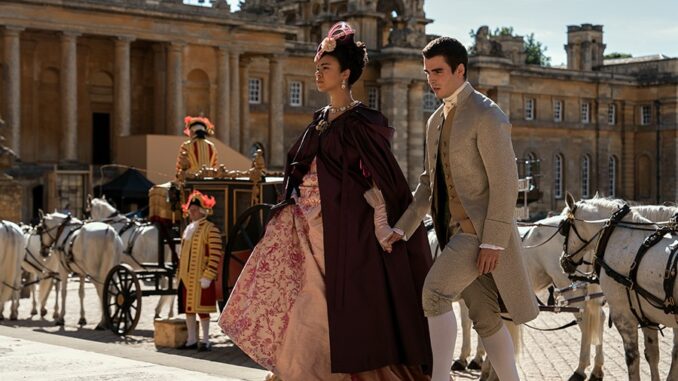
Queen Charlotte: The Great Experiment explained
In Queen Charlotte: A Bridgerton Story, King George’s marriage to Charlotte results in the Great Experiment, which makes the ton more inclusive.
In Queen Charlotte: A Bridgerton Story, King George III’s mother, Princess Augusta, arranges his marriage with Charlotte of Mecklenburg-Strelitz, who, as well as her family, has no choice but to accept the match.
There have been claims that the real-life Queen Charlotte was a woman of color, and in the show as well, Charlotte is a woman of color, but this comes as a surprise to Princess Augusta and the aristocrats who have arranged the union.
They believe that Charlotte’s skin color is going to be a problem. Since the trade deals have already been made and the arrangement cannot be canceled on the wedding day, they decide to make it look like choosing Charlotte was intentional on their part.

To make it believable, they decide to make changes to the current social order and call it the Great Experiment. The Great Experiment is responsible for creating the diverse society that is seen in the Bridgerton series.
The first step
Princess Augusta aims to give the impression that through the Great Experiment, the rulers are trying to make the ton more inclusive and unite the society. Choosing Charlotte to be the next queen is just the first step.
The Palace sends wedding invitations to influential people of color, including the Danburys and Smythe-Smiths, on the day of the royal wedding. Princess Augusta greets them first and bestows titles upon them. Additionally, Lady Danbury is told that she will be attending Charlotte as a part of her court. Craving acceptance
Although people of color get titles, they are not accepted by the other members of the ton. Lord Danbury wants nothing more than to be accepted by his peers, but he is not allowed entry to a gentlemen’s club or invited to the hunts like other gentlemen.
When Lady Danbury gets invited to have tea with Charlotte, Princess Augusta tries to get her to reveal what is going on between George and Charlotte. Lady Danbury refuses to divulge any information without getting what her husband and the others deserve.Princess Augusta is forced to grant the privileges that come with the title to all the newly titled individuals. They are given their own land, estate, cattle, and spots at Eton for their sons.
Despite this, the ton refuses to accept them. To change that, the Danburys wish to throw the first ball of the season, but Princess Augusta cannot allow Lady Danbury to do that. In fact, she asks Lady Danbury to cancel the ball.
Lady Danbury takes matters into her own hands and sends out the invitations before Princess Augusta can make up her mind. Princess Augusta faces pressure from the ton to get Lady Danbury to retract the invitations.
Furthermore, the other women of the ton decline Lady Danbury’s invitations. Lady Danbury fears that they might lose it all, and the colored members of the ton might never be accepted by the others.
Princess Augusta is forced to grant the privileges that come with the title to all the newly titled individuals. They are given their own land, estate, cattle, and spots at Eton for their sons.
Despite this, the ton refuses to accept them. To change that, the Danburys wish to throw the first ball of the season, but Princess Augusta cannot allow Lady Danbury to do that. In fact, she asks Lady Danbury to cancel the ball.
Lady Danbury takes matters into her own hands and sends out the invitations before Princess Augusta can make up her mind. Princess Augusta faces pressure from the ton to get Lady Danbury to retract the invitations.
Furthermore, the other women of the ton decline Lady Danbury’s invitations. Lady Danbury fears that they might lose it all, and the colored members of the ton might never be accepted by the others.
The final hurdle
When Lord Danbury dies, the newly titled members of the ton come to Lady Danbury with their concerns. The question now arises if the usual laws of succession will apply to them as well, or if they will lose their titles and lands with this generation.
Lady Danbury introduces her son as Lord Danbury to Princess Augusta, who informs her that it is not yet decided whether her son will inherit the title or not.

Since Lord Danbury is the first titled gentleman of color to die, Lady Danbury knows that the fate of several others depends on her son inheriting the title, which makes her anxious for their future.
Nothing seems to work in her favor, but that changes when Charlotte finds out about Lady Danbury’s problems. Charlotte asks Lady Danbury to come to her and the king with her worries and addresses her as Lady Danbury, not Mrs. Danbury, which means that her son will inherit the title.
The Great Experiment might never have succeeded in making the ton truly inclusive if it was not for the efforts of Lady Danbury, who used whatever power she had to ensure that the Great Experiment did not become just another shallow scheme that promises great things on paper but never delivers in reality.
It was because of the success of the Great Experiment that society was united in the fictional world of Bridgerton and that the next generation of the colored people of the ton, which includes the Duke of Hastings, enjoyed the same status in society as any other member of the ton.